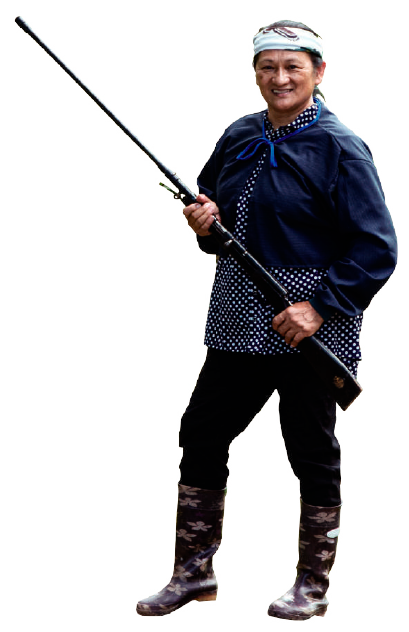
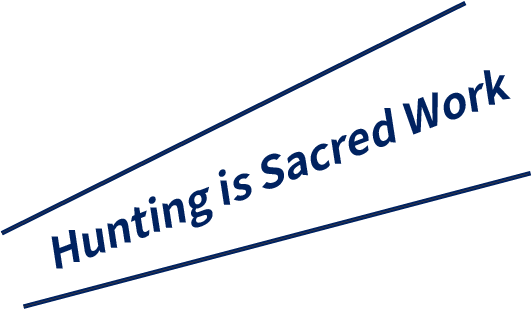
Mi Mi of the Truku people is one of the few indigenous huntresses with a “hunter certificate” issued by the government. She sees hunting as sacred work combining skills, wisdom, and art, and is dedicated to passing on the glory of hunters.
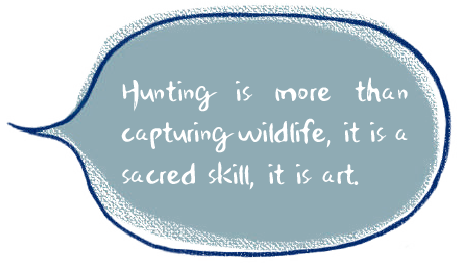
With a piece of wood and rope, a trap made to hide among the grass is completed in no time. “As soon as a boar steps on it, its feet will be caught in the loop and become suspended in mid-air,” Mi Mi, the huntress of Dowmung Community demonstrates effortlessly the everyday job of a hunter.
Since Mi Mi began hunting with her father at the age of 13, she understood that it is not only a way of life for her people, but also a way to make a living. Hunting provides food as well as produce to sell to the people on the ground. “Men hunt and women weave” may be the general labor distribution among indigenous communities, the Truku people has no rule against women hunting. Anyone can go into the mountains with elders if they are interested. “Women mostly act as assistants, for example setting the trap or carrying the game,” Mi Mi says. Even to this day, Mi Mi maintains the habit of hunting with her husband every month.
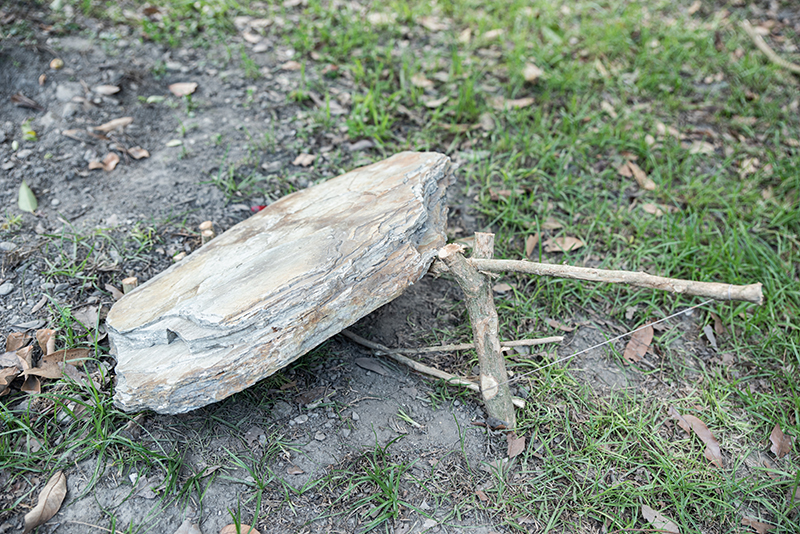
rat trap
Be Well-Equipped and Fully Adjusted to Enter the Mountains
To Mi Mi, every detail regarding hunting is meaningful, “hunting is more than capturing wildlife, it is a sacred skill, it is art.” Before setting off, a hunter needs to prepare personally the equipment and traps required and place them in a woven basket. If sleepovers and cooking is required in the mountains, in addition to the necessary knife and shotgun, rice, salt, and a pot are also in line. These tools are essential to a hunter. The female must never touch the equipment of a male hunter, and the traps must be handmade, personally, “when you make your own and pack your own, you are familiar with your equipment and that can prevent danger.”
There are many taboos regarding hunting. In addition to being well-prepared equipment-wise, one must also be mentally well-adjusted. For example, when going hunting, there must be no dispute at home, allowing the hunter to set off in peace. “If you’re upset, you have no game. Hunters also abstain from promiscuity, which may lead to your death instead of game, and that is one big taboo.” Mi Mi reiterates that hunting is “sacred” work, and a hunter must abide by rules, “a true hunter always keep a harmonious household”
The hunter must check the route one week prior to hunting. There are six clans in Dowmung Community, and each clan has its own hunting ground with individual routes for each hunter. “You cannot willfully trespass on other people’s route, and even if it’s your own clan’s route, you must notify others in advance before you enter their hunting ground. It is the rule, it is respect,” says Mi Mi.
Before going into the mountains, one must be in awe of the mountains. “You are taking food from the mountains, so you must respect the bequeath of nature.” Mi Mi explains that in the old days, elders would sprinkle alcohol and light tobacco in respect, but as they have converted religiously, they pray instead. Despite the different forms, the heart is always in awe.
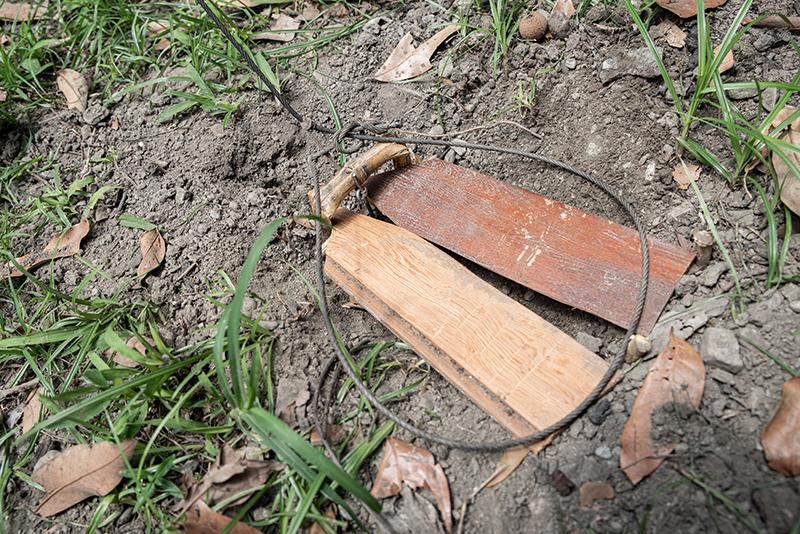
a trap for boar, goat, and muntjac (before disguise)
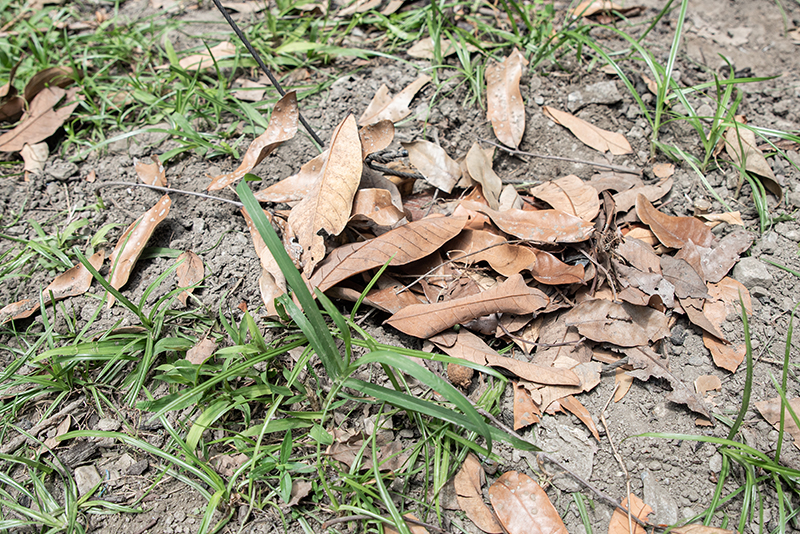
a trap for boar, goat, and muntjac (after disguise)
It is the Spirit of a Hunter
to Share Food from Nature
In the vast woods, a hunter must possess the skill to observe carefully the footprints of animals and the food they like, in order to find their traces. An excellent hunter can determine the size of an animal simply by one look in the eyes, and they mostly hunt adult animals instead of young ones. To hunt different animals, a hunter must first determine the route animals will pass by and set varying traps along the way. For example, goats tend to walk along the cliffs, so traps must be set on the crossings of different trails, whereas boar traps must be set on spacious flat lands. All of which are wisdom accumulated over the years.
Sometimes a hunter must disguise and take cover in a hut built from local materials and wait silently for a prey to pass by. The reason Mi Mi thinks that hunting is art is because the disguise must be perfect and seamlessly, so as not to be detected by the prey, “animals spend all their time in the mountains, and they know about everything that is going on along this route today, they are very smart!”
When hunting, one must remain quiet, and the barrel must always point upwards unless firing the shotgun, which does not use a lighted fuze. “You never know who else is in the mountains as well, it’s always better to be safe than sorry. You don’t want to be greedy and over-hunt either.” Mi Mi says that all hunted games must be carried back home, and everything that was given to the hunter must be cherished. Some merchants shoot down deer yet keep only the velvet and discard the entire carcass in the mountains, which is a very serious taboo. A hunter must also share. When you hunt together, you must share equally your game, and share with others in the village after reaching home, “sharing is the spirit of a hunter, it is food from nature, not something you own,” explains Mi Mi.
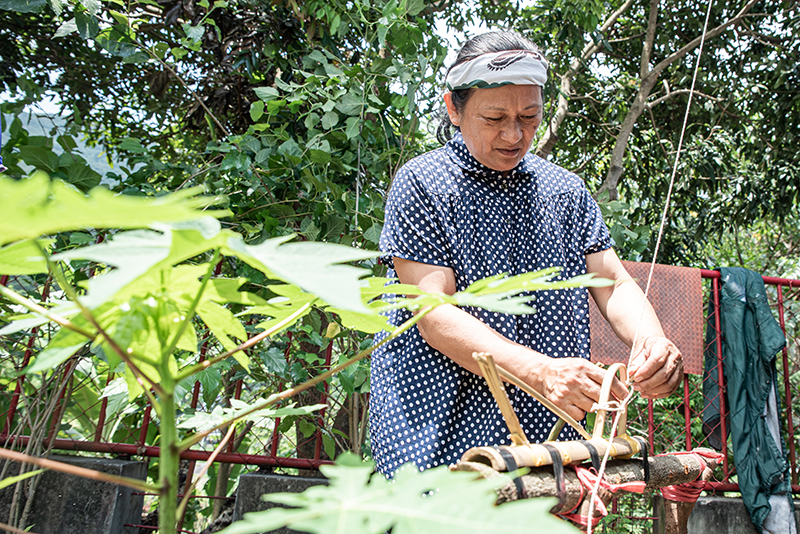
Mi Mi demonstrates how to set a bird trap
Hunter should be Revered,
How are We Criminals?
Mi Mi may be well-versed in the rules of hunting, but her community once faced discontinuation of the hunting culture. The story begins from the Wildlife Conservation Act enacted in 1989. The Wildlife Conservation Act stipulates that protected wildlife species must not be hunted and may face up to three years sentence if violated; unprotected wildlife species may only be hunted within the “hunting area” demarcated by the city/county government. However, no city/county government in Taiwan has demarcated hunting areas, therefore the Wildlife Conservation Act is basically announcing that the entire Taiwan is a “no hunting zone”.
In 2004, the Wildlife Conservation Act was amended with two articles concerning indigenous peoples, namely if hunting is required by traditional culture or rituals and ceremonies, strict regulations will not apply. However, detailed bylaws were not announced until 2012, with some contents still contradicting indigenous cultures. For example, the government requires that application must be made to the city/county government prior to hunting, stating the personal information of the hunter, area and time of hunting, and the estimated number of animals to be hunted. But such estimation is a serious violation of indigenous taboo, “when you hunt, it is up to nature to decide how much you may hunt, it is taboo to predict such number, you will end up with zero if you do,” Mi Mi says without a smile.
“When hunting used to be prohibited, we were all afraid of being caught, and stayed as far away from the police as possible. Hunting is our life, yet such lifestyle is against the law right here in the traditional territories of indigenous peoples.” Mi Mi admits that seeing indigenous people being caught one after another was really hard to watch, “hunter should be revered, how are we criminals?”
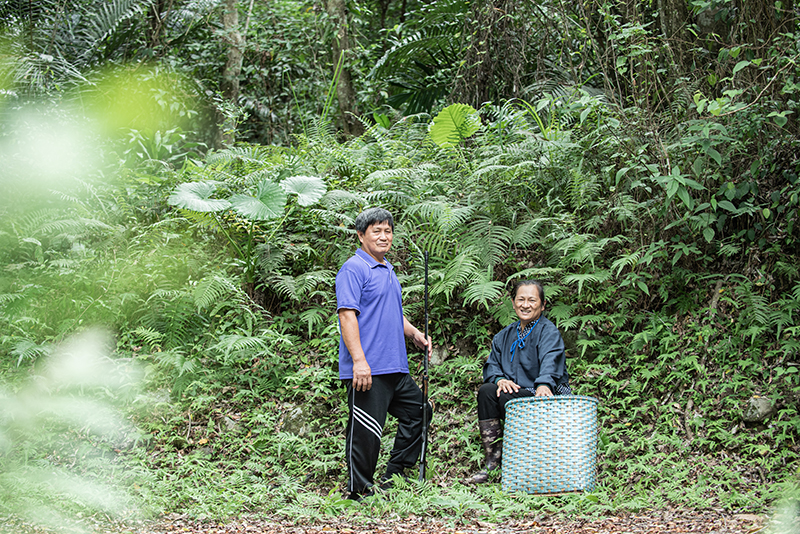
Mi Mi and her husband are both hunters
No Hesitation,
Carry On the Hunting Culture with Resolution
To solve the prolonged problem of secret hunting, the Forestry Bureau of Council of Agriculture under Executive Yuan organized a collaborative program between 8 forest districts and 11 indigenous villages or organization in 2017 and put forward the “Indigenous Hunting Self-management Program”, returning the right of hunting management to indigenous communities, and helped indigenous people to obtain the hunter certificate to hunt legally. Therefore, Dowmung Community in Xiulin Township established a hunters’ association, formed collaboration with Hualien Forest District Office and National Dong Hwa University, and became the second indigenous community in Taiwan in 2019 to issue hunter certificates. Mi Mi and her husband are both founders.
To qualify for a hunter certificate, one must take courses in traditional rules, hunting skills, and gun safety, and finally be approved by elders to pass. The certificate must be renewed every two years, and the hunter must follow the rules to continue qualify as a hunter. Over 90 indigenous persons have acquired the hunter certificate in her community so far, among which a dozen or so are female, mostly the wife of male hunters.
Mi Mi points out that, “it is better to have a legal hunter certificate. Hope that we can continue our hunting culture in a safe environment, so that our children and the society can see that hunting is more than just capturing food, it is about skills, wisdom, culture, and art, which are all closely connected to our lives.” Putting behind the shadow of hunting prohibition, the indigenous community is now on its way to resume the former glory of hunters.




